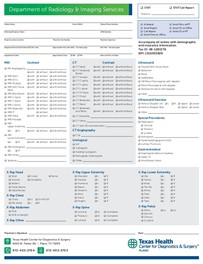Breast MRI
A Breast MRI is often used in women who already have been diagnosed with breast cancer, to help measure the size of the cancer, look for other tumors in the breast, and to check for tumors in the opposite breast.
For certain women at high risk for breast cancer, a screening MRI is recommended along with a yearly mammogram. MRI is not recommended as a screening test by itself because it can miss some cancers that a mammogram would find.
Although MRI can find some cancers not seen on a mammogram, it’s also more likely to find something that turns out not to be cancer (called a false positive). False-positive findings have to be checked out to know that cancer isn’t present. This can mean more tests and/or biopsies. This is why MRI is not recommended as a screening test for women at average risk of breast cancer, because it would result in unneeded biopsies and other tests for many of these women.
 Download Form
Download Form